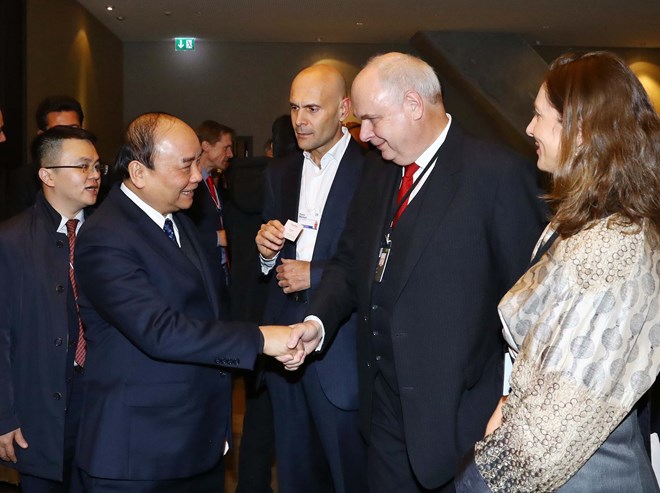Vietnam – one of best investment havens: PM
Thứ Năm, 24/01/2019, 21:23
Prime Minister Nguyen Xuan Phuc chaired a dialogue with executives of nearly 40 multinational groups in Davos, Switzerland, on January 23 (local time), an activity within the framework of the ongoing World Economic Forum (WEF) Annual Meeting 2019.
The dialogue was themed “Fostering Dynamics and Innovation in the 4th Industrial Revolution”. This was the first time the country had coordinated with the WEF to organise a Vietnam economic dialogue on the sidelines of a WEF annual meeting in Davos.
Opening the event, WEF Managing Director Olivier Schwab highlighted the robust economic growth of Vietnam over the last 30 years, noting that the development of the country’s business community has been clearly shown at this time’s WEF.
He affirmed that the WEF hopes Vietnam will further integrate into the international community and enhance coordination with the WEF in the future.
 |
| Prime Minister Nguyen Xuan Phuc (second, left) greets executives of multinational groups at the Vietnam economic dialogue in Davos on January 23 (Photo: VNA) |
Vietnam has worked out favourable mechanisms and policies to facilitate development and remove difficulties facing enterprises, and its business climate has been improved strongly, he noted, adding that the total trade revenue approximated 480 billion USD with a trade surplus of 7.4 billion USD last year.
The country has become one of the world’s largest producers of consumer goods, including electronics, textile-garment and footwear. It is currently home to 26,000 foreign direct investment (FDI) projects totally worth nearly 350 billion USD of many major firms like Siemen, Novatis, Carlsberg, Mitsubishi, Toyota, Samsung, LG, Exxon Mobil, Ford and GE.
The PM affirmed that the Vietnamese Government always takes heed to opinions of foreign enterprises and pledges to form a transparent legal framework that is approaching to advanced international standards.
Vietnam and the European Union (EU) are working actively towards the early signing and ratification of the EU-Vietnam Free Trade Agreement (EVFTA), he added, asking the EU companies at the dialogue to help accelerate this deal’s signing.
Regarding Industry 4.0’s strong influence on each enterprise, PM Phuc said Vietnam considers this a big opportunity when countries compete by innovation, not only by traditional factors like free trade, size, experience, labour and investment capital.
Vietnam has become one of the countries with the largest optical cable network coverage as nearly 1 million km of cables have reached villages, communes and districts nationwide, internet users account for 60 percent of the population, and up to 98 percent of the population have gained access to 3G and 4G mobile networks.
To prepare for Industry 4.0, Vietnam will pilot the 5G technology this year and commercialise it in 2020, turning itself into one of the pioneers in the application of this technology, he said.
PM Phuc called on international firms to come to Vietnam and make Industry 4.0 products here.
Vietnam will take the lead in building a policy framework that is receptive to new technologies, PM Phuc stressed, adding that it will strongly step up the public-private partnership to create breakthrough and environmentally friendly services and products.
Calling Vietnam one of the best investment havens in the changing world, he invited investors to the country, stressing that it always opens its door to them.
At the dialogue, representatives of multinational groups said Vietnam is their important market and production hub.
Stressing their support for the EVFTA, they expected the Vietnamese Government will continue creating favourable conditions for their operation in the country.
A representative from Dutch brewing company Heineken, which has invested in Vietnam for 25 years, said the Southeast Asian nation hosts its most creative production facility in the globe, voicing its hope for further assistance from local authorities.
British-Dutch consumer goods company Unilever considers its 24-year operation in Vietnam a big success and is proud of the business, said its representative.
A representative of German industrial manufacturer Siemens projected Vietnam’s potential to make a great leap in auto and mechanical manufacturing, adding that the group is willing to stand side-by-side with Vietnam in these sectors.
Siemens suggested the Vietnamese Government increase investment in infrastructure and boost human resources capacity to make use of technologies transferred by the company.
Anthony Ping Yeow Tan, co-founder and CEO of Singapore-based technology company Grab, said Vietnam is the second country that it has invested in to develop networks.
He noted Grab has so far poured over 100 million USD into the country, developing technological centres with hundreds of engineers and generating jobs for 150,000 partners. Grab is a happy investor in Vietnam and proud to be present here, he stated and asked how the Vietnamese Government thinks of new technological business model like Grab.
In response to the question, Minister of Information and Communications Nguyen Manh Hung said Grad is a fresh business model that makes strong impact on traditional ones. He announced that the Government’s policy related to the fourth industrial revolution tends to support new business models based on technology, so Grab and similar models will receive positive treatment.
Further elaborating on this, PM Phuc affirmed that the Vietnamese Government is willing to assist breakthrough ideas and models, which include innovative values, startup spirit and improved trend that help bring more benefits and convenience to the people.
VNA

